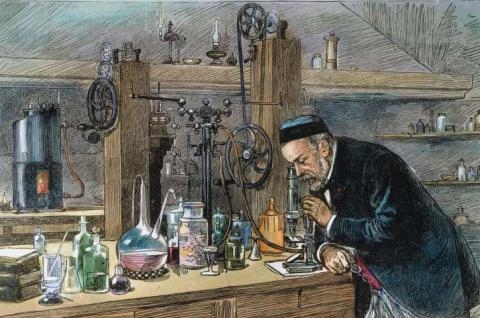-
Table of Contents
- 0. STORY PREFACE
- 1. RABIES - WHAT'S in a NAME?
- 2. RABIES in ANCIENT TIMES
- 3. WHAT IS RABIES?
- 4. LOUIS PASTEUR - EXPERIMENTER
- 5. LOUIS PASTEUR MEETS JOSEPH MEISTER
- 6. A TEEN HERO NAMED JEAN-BAPTISTE JUPILLE
- 7. LOUIS PASTEUR - WORLDWIDE BENEFACTOR
- 8. RABIES as a 21st-CENTURY PROBLEM
- 9. RABIES and ZOMBIES
This illustration depicts Louis Pasteur in his laboratory. The French wood engraving, circa 1885, is after a drawing by Adrienne Marie Louise Grandpierre-Deverzy.
Louis Pasteur lived nearly seven more years after the Pasteur Institute opened its doors in late 1888. He remained its first director until his death. A national hero in France, Pasteur was honored with a state funeral when he died on September 28, 1895.
Earlier in his life, Pasteur was an artist best-known for his portraits. When he began his systematic work in science, that creative side - particularly his imagination - helped him in unexpected ways. He used these words (translated into English) to describe his method of thinking and experimenting:
Imagination should give wings to our thoughts but we always need decisive experimental proof, and when the moment comes to draw conclusions and to interpret the gathered observations, imagination must be checked and documented by the factual results of the experiment.
Ernest Renan, a famous philosopher, assessed Pasteur’s approach to science:
This marvelous experimental method eliminates certain facts, brings forth others, interrogates nature, compels it to reply and stops only when the mind is fully satisfied. The charm of our studies, the enchantment of science, is that, everywhere and always, we can give the justification of our principles and the proof of our discoveries.
Not only did Pasteur embody a brilliant mind, his rigorous approach to finding answers helped him to become one of the world’s greatest benefactors. It is almost staggering to comprehend what one man was able to accomplish in his lifetime:
- He solved the mysteries of chicken cholera and anthrax
- He invented a vaccine to help people and animals survive rabies
- He determined why silkworms were dying, thereby saving France’s silk industry
- He debunked the concept of spontaneous generation
- He explained the scientific basis for fermentation, impacting wine-making and beer-brewing
- He developed the process of pasteurization, saving millions of people from getting sick or dying
- He set the stage for modern biology and biochemistry (including stereochemistry, microbiology, bacteriology, virology, immunology and molecular biology).
Although he was a national hero in France, Pasteur believed that science and knowledge belong to all people:
Science knows no country, because knowledge belongs to humanity, and is the torch which illuminates the world.
Although he was not a medical doctor, Pasteur had a fervent desire to help suffering people:
One does not ask of one who suffers: “What is your country and what is your religion?” One merely says: “You suffer, that is enough for me.”
Pasteur’s work continues to help people, although not-enough individuals around the world benefit from his work with rabies. Although the virus in humans no longer has to be fatal, around 55,000 individuals still die every year from rabid-animal bites.
Where - and why - is this happening?
-
Table of Contents
- 0. STORY PREFACE
- 1. RABIES - WHAT'S in a NAME?
- 2. RABIES in ANCIENT TIMES
- 3. WHAT IS RABIES?
- 4. LOUIS PASTEUR - EXPERIMENTER
- 5. LOUIS PASTEUR MEETS JOSEPH MEISTER
- 6. A TEEN HERO NAMED JEAN-BAPTISTE JUPILLE
- 7. LOUIS PASTEUR - WORLDWIDE BENEFACTOR
- 8. RABIES as a 21st-CENTURY PROBLEM
- 9. RABIES and ZOMBIES


 Back
Back
 Next Chapter
Next Chapter

 Back
Back
 Next Chapter
Next Chapter